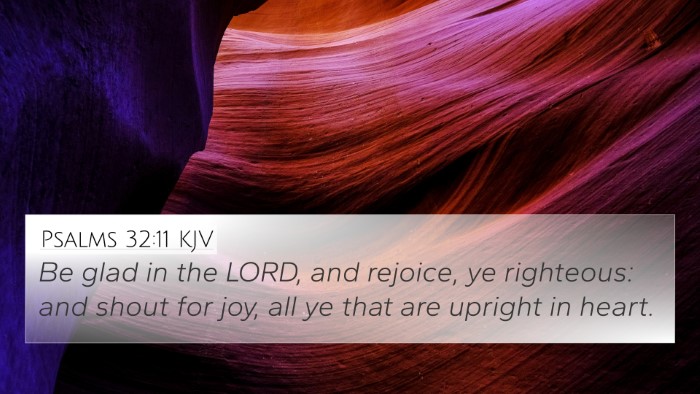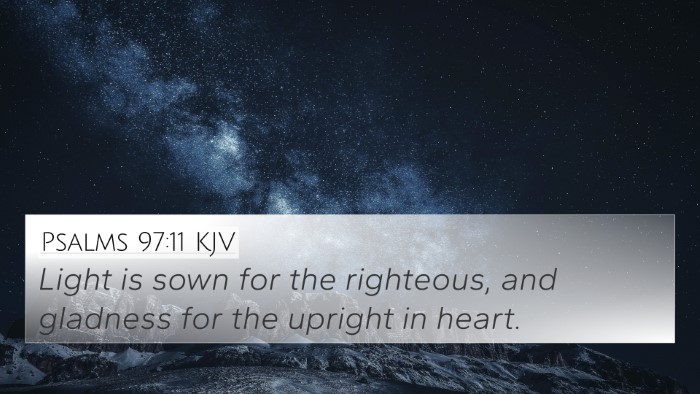Psalms 64:10 - Commentary and Interpretations
Verse Text: "The righteous shall be glad in the LORD, and shall trust in him; and all the upright in heart shall glory."
This verse from Psalms 64:10 encapsulates themes of joy, trust, and righteousness before God. Below is a detailed interpretation combining insights from public domain commentaries by Matthew Henry, Albert Barnes, and Adam Clarke.
Meaning and Insights
1. The Righteous Shall Be Glad:
Matthew Henry emphasizes that the gladness mentioned in this verse is a natural response of the righteous. Their joy is rooted in their relationship with the LORD, acknowledging His sovereignty and goodness.
Albert Barnes highlights that this joy is not just superficial; it stems from confidence in God's justice and protection. Believers find happiness not only in their deliverance from trials but also in their trust in divine providence.
Adam Clarke argues that this joy reflects the inner peace the righteous experience, knowing they are secure in their faith and obedience to God's ways.
2. Trust in Him:
This trust distinguishes the righteous from those who walk in wickedness. Matthew Henry notes that the righteous rely on God in every circumstance, especially during times of trial. The assurance of His presence brings them comfort.
Barnes adds that trusting in God also implies an active reliance on His promises, demonstrating faith that He will act in their favor.
Clarke mentions that this trust is essential for spiritual endurance, suggesting that true faith is demonstrated through commitment, especially in facing adversities.
3. The Upright in Heart Shall Glory:
This phrase points out that those who maintain integrity and righteousness in their hearts are destined for glory. Henry explains that this glory can be understood both in this life as well as in the life to come, indicating ultimate victory and vindication from God.
According to Barnes, the concept of ‘glory’ encompasses the recognition and honor that the upright will receive from God, fitting into the broader theme of divine justice that the Psalms often portray.
Clarke indicates that the term ‘upright in heart’ refers to pure intentions and motives aligned with God’s will, suggesting that such righteousness will ultimately be rewarded.
Cross References and Thematic Connections
Understanding Psalms 64:10 draws strength from various scripture links. Here are some pertinent cross-references:
- Psalms 32:11: "Be glad in the LORD, and rejoice, ye righteous: and shout for joy, all ye that are upright in heart."
- Psalms 37:4: "Delight thyself also in the LORD; and he shall give thee the desires of thine heart."
- Psalms 112:6: "Surely he shall not be moved for ever: the righteous shall be in everlasting remembrance."
- Proverbs 10:28: "The hope of the righteous shall be gladness: but the expectation of the wicked shall perish."
- Isaiah 41:10: "Fear thou not; for I am with thee: be not dismayed; for I am thy God: I will strengthen thee; yea, I will help thee."
- Romans 5:1-2: "Therefore being justified by faith, we have peace with God through our Lord Jesus Christ."
- Philippians 4:4: "Rejoice in the Lord always: and again I say, Rejoice."
Connecting Themes
This verse connects with various themes across the Bible, illustrating the inter-Biblical dialogue on righteousness, trust, and divine joy. These themes produce a deeper understanding of God’s character and the believer's standing before Him.
Conclusion
Psalms 64:10 serves as a profound reminder of the joy and trust that characterize the righteous. Through cross-referencing related Bible verses, one can appreciate the continuity and unity of God’s message throughout the Scriptures. The insights from Matthew Henry, Albert Barnes, and Adam Clarke enrich our comprehension, helping believers to connect their faith with the hope and joy promised in Christ.
Keywords for Further Study:
- Bible verse cross-references
- Connections between Bible verses
- Linking Bible scriptures
- Comparative Bible verse analysis
- Bible verses that relate to each other
- Cross-referencing Biblical texts
- Thematic Bible verse connections
- Bible verse parallels
- Scriptural cross-referencing
- Inter-Biblical dialogue














